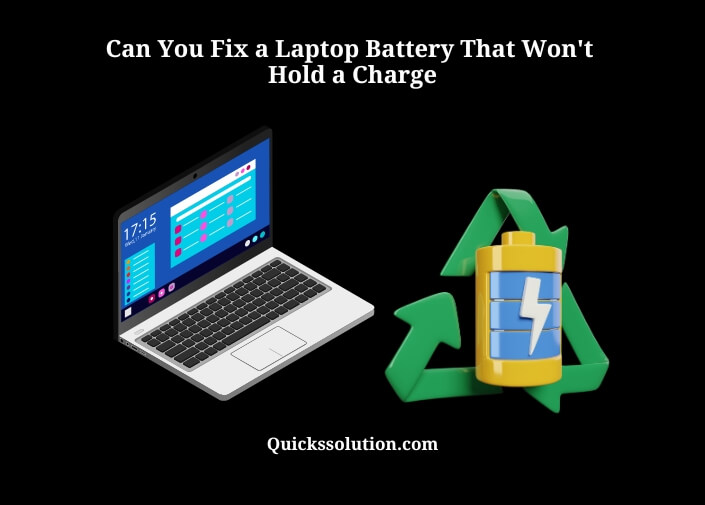Published on: July 5, 2024
Written by John Stevens / Fact-checked by Hashim Manna
Laptop batteries are notoriously finicky. If your laptop battery won’t hold a charge, it might be due to a number of different factors. Age, heat exposure, and frequency of use can all contribute to a decrease in battery life.
In some cases, you might be able to fix the problem yourself. But in other cases, you’ll need to replace the entire battery.

- Start by checking the laptop’s power settings to make sure that it is not set to “Battery Saving Mode
- ” If it is, try changing it to “High Performance Mode” and see if that makes a difference
- Next, take a look at the condition of the battery itself
- If it looks swollen or damaged in any way, it needs to be replaced
- If the battery appears to be in good condition, try charging it for a full cycle (from 0% to 100%) using an AC adapter
- Once it’s fully charged, unplug the AC adapter and see if the laptop can run on battery power alone
- If your laptop still won’t hold a charge after following all of these steps, you may need to replace the battery entirely
Laptop Battery Wont Hold a Charge Fix (Doesn’t Last, Charge or Dies Quickly)
Laptop Won’T Hold Charge Unless Plugged in
If your laptop won’t hold a charge, it’s possible that the battery is simply old and needs to be replaced. However, there could also be an issue with the charging port or power cord. In either case, it’s important to troubleshoot the problem so that you can get your laptop up and running again.
One possibility is that the charging port is loose or damaged. If this is the case, you’ll need to have it repaired or replaced by a professional. Another possibility is that the power cord is damaged.
Inspect the cord for any fraying or other damage and replace it if necessary. If neither of these solutions solves the problem, then it’s likely that the battery itself needs to be replaced. This is something you can do yourself if you’re comfortable working with electronics, or you can take it to a professional for help.
Either way, replacing the battery should fix the problem and get your laptop holding a charge again.
HP Laptop Battery Not Holding Charge
If your HP laptop battery isn’t holding a charge, there are a few things you can do to try and fix the problem. First, check the power cord and make sure it’s firmly plugged into both the laptop and the outlet. Next, check the battery itself to see if there are any obvious signs of damage.
If not, try resetting the power management settings on your laptop. Finally, if none of these solutions work, you may need to replace the maintenance free battery.
Dell Laptop Battery Not Holding Charge
If you’ve noticed that your Dell laptop battery isn’t holding a charge like it used to, there are a few possible explanations. It could be a simple issue like a loose power cord connection, or it could be something more serious like a failing battery.
Here are some tips to help you troubleshoot the problem and get your laptop battery back up to speed:
– Check the power cord connection first. Make sure it’s firmly plugged into both the laptop and the wall outlet. If it’s loose, try wiggling it around a bit until it feels snug.
– If that doesn’t work, try calibrating your battery. This can be done by draining the battery all the way down and then charging it back up to full capacity. You can find instructions for how to do this online or in your Dell user manual.
– If neither of those solutions seem to help, you may need to replace your battery. Fortunately, replacement batteries for Dell laptops are readily available and relatively affordable. You can purchase one from an authorized Dell dealer or directly from Dell’s website.
5 Ways to Fix Laptop Battery Not Charging
Laptop batteries are designed to last for a long time, but they don’t last forever. Over time, the battery will start to hold less of a charge and eventually it will need to be replaced. If your laptop battery is not charging, there are a few things you can try to fix the problem.
1. Check the Battery Packaging When you first get a new laptop, the battery may not be fully charged. Make sure to check the packaging for information on how to properly charge your particular model’s battery.
Once you have read the instructions and plugged in your laptop, give it some time to charge fully before using it unplugged.
2. Use an AC Adapter that Meets the Required Specifications Your laptop’s AC adapter needs to meet certain specifications in order for it to work properly and not damage your computer.
Check your laptop’s manual or manufacturer website to find out what kind of adapter you need and make sure you are using one that meets those requirements exactly. The wrong adapter could cause all sorts of problems beyond just preventing your battery from charging. It is also important not use any adapters made by third-party companies as they may not adhere to these required specifications either.
Laptop Says Low Battery Even When Plugged in
If you’ve ever been working on your laptop only to have it suddenly die on you, even though it’s plugged in, you’re not alone. Many people have experienced this frustrating issue. There are a few things that could be causing your laptop to say it’s low on battery even when it’s plugged in.
It could be a problem with the battery itself, the power adapter, or the charging port. If you’ve ruled out those possibilities, and your laptop still dies even when plugged in, there could be a software issue at play. A corrupted BIOS or power management settings can cause your laptop to behave this way.
Fortunately, there are a few things you can try to fix the problem.
Try updating your BIOS and power management settings. If that doesn’t work, you can try resetting your laptop’s power options back to their defaults.
If all else fails, you may need to replace your laptop’s battery or charging port.
HP Laptop Battery Won’t Fully Charge
If your HP laptop battery won’t fully charge, there are a few things you can try to fix the issue.
Make sure that the power cord is firmly plugged into both the laptop and the wall outlet.
Check the power settings to ensure that the laptop is set to run off of AC power rather than battery power.
Try resetting the System Management Controller (SMC). If none of these solutions work, you may need to replace your HP laptop battery.
Why My Laptop Battery is Not Charging?
If you’re having trouble charging your laptop battery, there are a few things you can try to fix the issue.
Make sure that the charger is properly plugged into the wall outlet and your laptop. Sometimes chargers can come loose, so it’s important to check that the connection is secure.
If your charger seems to be working properly, the next thing to check is the battery itself. If your battery is more than a few years old, it may no longer be able to hold a charge. In this case, you’ll need to purchase a new battery from your laptop’s manufacturer or an authorized retailer.
If you’ve ruled out both the charger and the battery as potential issues, then there could be a problem with your laptop’s charging port. Over time, dust and debris can build up in the port and prevent proper contact between the charger and your laptop. To clean out your charging port, use a small brush (toothpicks work well) to gently remove any debris.
Once you’ve cleaned out the port, try plugging in your charger again and see if it works. If none of these tips solve your problem, then you may need to take your laptop to an authorized service center for further diagnosis.
Dead Laptop Battery Won’T Charge
If your laptop battery won’t charge, it’s important to understand the potential causes and how to fix them. In this blog post, we’ll explore some of the most common reasons why your laptop battery might not be charging, and provide helpful tips on how to get it working again.
One of the most common reasons for a dead laptop battery is simply that it needs to be replaced.
Laptop batteries have a finite lifespan, and eventually they will stop holding a charge no matter what you do. If your laptop is more than a few years old, it’s likely that the battery needs to be replaced.
Another common reason for a dead battery is that there is something wrong with the charging cable or port.
If you’re using an aftermarket charger or cable, make sure that it’s compatible with your laptop and that it’s properly plugged in. Sometimes the problem can be as simple as dust or dirt buildup in the charging port, so give it a good cleaning before assuming that you need a new charger or cable.
If those two solutions don’t work, then there could be an issue with your laptop’s power management software or BIOS settings.
To rule out these possibilities, try resetting your laptop to its factory default settings and seeing if that fixes the problem. If all else fails, you may need to take your laptop to a qualified repair technician for further diagnosis and repairs.

How Do I Fix My Laptop Battery That Doesn’T Hold a Charge?
If your laptop battery won’t hold a charge, there are a few things you can try to fix the problem. First, make sure that the battery is properly installed in the laptop. If it is not, then reinstall it according to your laptop’s instructions.
Sometimes, a loose battery connection can cause problems. Next, check to see if the battery itself needs to be replaced. If it is more than three years old, then it is probably time for a new one.
You can also try calibrating the battery, which can help extend its life. To do this, discharge the battery completely and then recharge it fully. This should be done every few months or so.
If none of these solutions work, then you may need to take your laptop to a professional for further diagnosis and repair.
How Do You Make a Laptop Battery Hold a Charge?
Laptop batteries are designed to hold a charge for a specific amount of time. The amount of time may vary depending on the brand and model of laptop. In general, most laptop batteries will hold a charge for 3-5 hours.
To make sure your battery holds a charge for as long as possible, there are a few things you can do:
1) Avoid using your laptop while it is plugged into an outlet. When your laptop is plugged in, it is constantly drawing power from the outlet which can shorten the lifespan of your battery.
2) Use your laptop on battery power when possible. This will help train your battery to maintain its charge longer. 3) Store your laptop in a cool, dry place when not in use.
Heat and moisture can damage your battery and cause it to lose its ability to hold a charge over time.
Can You Rejuvenate a Laptop Battery?
A laptop battery can last for several years with proper care. However, over time, the battery will begin to lose its capacity to hold a charge. When this happens, it’s time to rejuvenate the battery.
There are a few things you can do to help rejuvenate a laptop battery:
1. Store the battery in a cool, dry place when not in use. Avoid extreme heat or cold as this can damage the battery.
2. Use your laptop regularly. Batteries last longer when they’re used on a regular basis and allowed to discharge completely occasionally. This helps keep them “active” and prevents them from becoming “lazy.”
3. Calibrate your laptop’s battery regularly. This helps ensure that the computer is correctly reporting the level of charge left in the battery. To calibrate, fully discharge the battery until your laptop shuts down, then recharge it to 100%.
Repeat this process once every few months or as needed.
Why Won’t Battery Hold a Charge?
If your laptop battery isn’t charging, there could be a few different reasons as to why. In this article, we’ll go over some of the most common issues that can cause your battery to stop holding a charge. One of the most common reasons why batteries won’t hold a charge is because they are old and need to be replaced.
Batteries have a limited lifespan, and after a certain number of years (usually around 3-5), they will start to degrade and won’t hold a charge as well as they used to. If you think your battery might be getting old, the best course of action is to replace it with a new one. Another reason why your battery might not be holding a charge is because there is something wrong with the charging port on your laptop. Read more: How Do I Stop My AirPods From Beeping With Low Battery?
If the charging port is loose or damaged, it can prevent the power from flowing properly into the battery, causing it to not charge. Try wiggling the charger cord around in the port to see if that helps, and if not, you may need to have your laptop looked at by a technician. Lastly, another potential reason for why your battery isn’t charging could simply be because the charger itself is broken or not working properly.
Try plugging in another charger (from another device) into your laptop and see if that charges the battery; if it does, then you know it’s an issue with just the charger and not anything else. If none of these solutions work, then you should take your laptop into an authorized repair shop for further diagnosis.
Wrap Up
Laptop batteries are designed to last for a certain number of charges, but eventually they will need to be replaced. If your laptop battery isn’t holding a charge like it used to, it’s probably time for a new one. There are a few things you can try to extend the life of your battery, but eventually you’ll need to replace it.
You might also like:



